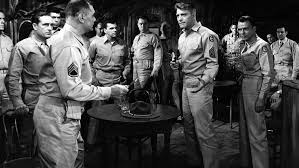Eye For Film >> Movies >> From Here To Eternity (1953) Film Review
From Here To Eternity
Reviewed by: Chris

This is a film that many people now will know for its most famous scene: the kiss and embrace on the beach between Deborah Kerr and Burt Lancaster. That scene is truly awesome. Technically, emotionally and for its timeless appeal. Often copied and even parodied, it is one of the best lip-clinches in cinematic history. For viewers looking back on it now, little can be said of the rest of the film in such superlatives. But it is worth watching for that kiss.
The story is a watered down version of a famous novel. Set in the American army just before the Japanese bombing of Pearl Harbor, it shows the harsh reality of the attack (in a finale that is in sharp contrast to the easygoing flamboyance of the rest of the movie). It was one of the first films to show the harshness of military life, including bullying (though this was one of the many aspects watered down for the censors at the time). It has award-winning or famous performances from many stars who are still household names. A vast amount of talent was poured into it. Some subtleties (such as Deborah Kerr playing against her standard, pure-as-the-driven-snow roles) will be lost on modern audiences if they miss the contrasts. But who has not heard of the title?

Two love stories form subplots to the main story, which is one of a harsh and unfair commander (together with a brute also in charge of the stockade) and an unfairly victimised young bugler. There is a passionate and illicit love affair between a First Sergeant and the Commander's wife. Then there is an equally furtive liaison between the young bugler (in between beatings) and a 'hostess'. Using Hawaii as a backdrop, there is great contrast between the idyllic setting on one hand and the vicious treatment of junior soldiers (not to mention the horrific bombing scenes) on the other. And some nice bugle playing.
The merits of the film could be eulogised at greater length, but in the interests of balance and to reflect the concerns of modern audiences, two other aspects might be mentioned. At least they were things that stuck out quite horribly to me, so I am going to mention them.
The first is the overwhelming portrait of drunkenness and brawling (according to reports, the first was common among some of the stars, not just the characters). There are many justifications, including the suffering they were going through and the general tolerance of alcohol in American society. But what I found disconcerting (and still find disconcerting in many modern films featuring American soldiers, both fiction and documentary) is the toleration. If viewed through the lens of a society that doesn't embrace drunkenness (for instance Brazil, which is about the same size as America), it portrays a simplistic picture of American G.I.s as drunken louts. The datedness of the scenarios, although probably effective at the time, makes such obnoxious behaviour stand out all the more.
The second thing that made me feel uncomfortable (though not to the same extent as the thoroughly awful modern film, Pearl Harbor) is the pervasive jingoism. America, it seems, can confront its own weakness in films about Vietnam (when the war was so obviously lost), but in 1953, as now, America was 'all perfect' and Japan was 'all evil'. It would be refreshing to see a film that embraced not only the inhumanity of Japanese attacking forces but acknowledged some of the background - the Washington-imposed oil-blockade of Japan that gave that small nation state the bleak choice of capitulation or war.
From Here to Eternity is a great film. But it is perhaps little wonder why the excerpted clips are usually of Burt and Deborah on the beach rather than Sinatra falling about drunk. The realistic footage of unexpected bomb attacks however, probably deserves more acknowledgement.
Reviewed on: 04 Oct 2007

















